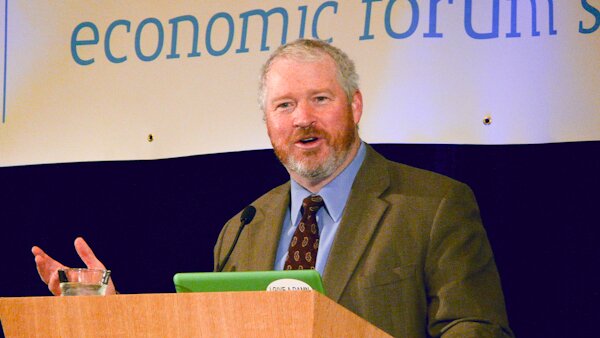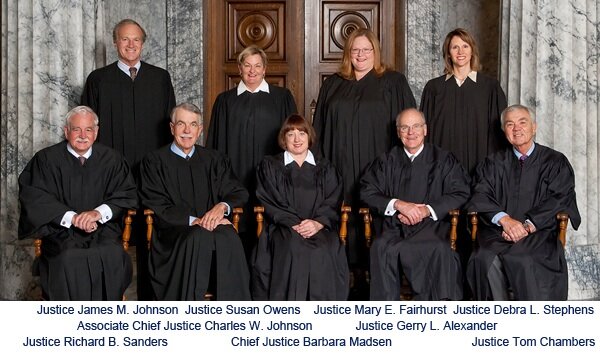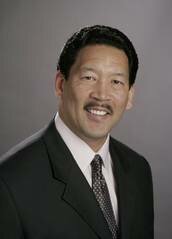Michael van Baker

About Michael van Baker:
Neighborhood: |
Capitol Hill |
Last Login: |
Online |
Joined: |
September 01, 2009 |
Profile viewed: |
2694 times |
Total Audience: |
361760 views |
| Editor & Publisher of The SunBreak | |
Storiesby Michael van Baker |
View by List | Grid |
 Graphic from Washington State Elections
Graphic from Washington State Elections
King County's estimated population is 1.9 million, of which almost 1.1 million are registered voters. Mid-term elections are historically less likely to draw people to the polls, but with all-mail voting, King County doesn't have to draw people anywhere but a mailbox. The result? A new record: 71 percent of King County's voters cast a ballot this year.
That might seem less impressive compared to the 84 percent turnout for the Presidential election in 2008, but it beats 2006's 65 percent, and 2002's 45 percent, handily. The rest of Washington state grumbles about King County "stealing" elections, but the county's impact is thanks to reality's well-known liberal bias: Only 3.6 million of Washington State's 6.6 million residents are registered voters, about 55 percent.
King County, the single most populous county, also has an edge in registered voters, at 58 percent. These marginal differences--in registered voters, in voter turnout--often make the difference. Senator Patty Murray's win this year is a case in point. Statewide, the Murray/Rossi race comes out to roughly 51 to 49 percent, but in King County it's currently breaking 63 to 36 percent, and King Country represents fully one-third of the state's registered voters. (In 2004, King County went for Murray over Nethercutt, 65 to 33 percent.)
Murray is winning in just eight counties out of Washington's 39, but in only three of those counties (King, Jefferson, and Thurston) is her margin more than six percent. That's the King County difference. Ironically, the more densely populated King County becomes (a trend mocked and disparaged by much of our lebensraum-loving state) the greater impact it will have on the state's political fortunes.
 The first thing about La Bête is to be clear where on Capitol Hill it actually is. It turns out to be down around where The Saint is, but around the corner on Bellevue. It's a decent-sized spot, able to crowd in a good amount of brunch-goers; brunch on the weekend begins at 10:30 a.m. Coffee comes in French presses. The food and drinks are the work of Tyler Moritz and Aleks Dimitrijevic, with cocktails and wines by the glass generally ranging from $8-$10. We were looking for a brunch spot suitable for an editorial meeting, and this fit the bill nicely--it was never too loud, even when full. Read on for thumbnail reviews of brunch options.
The first thing about La Bête is to be clear where on Capitol Hill it actually is. It turns out to be down around where The Saint is, but around the corner on Bellevue. It's a decent-sized spot, able to crowd in a good amount of brunch-goers; brunch on the weekend begins at 10:30 a.m. Coffee comes in French presses. The food and drinks are the work of Tyler Moritz and Aleks Dimitrijevic, with cocktails and wines by the glass generally ranging from $8-$10. We were looking for a brunch spot suitable for an editorial meeting, and this fit the bill nicely--it was never too loud, even when full. Read on for thumbnail reviews of brunch options.
 The eagerly anticipated coffee cake showed up at the table moist and still warm from the oven. It had a healthy amount of crispy brown sugar on top, which is a non-negotiable coffee cake requirement. Audrey wanted to put it in a bowl and pour cream atop it until it became gooey mush cake.
The eagerly anticipated coffee cake showed up at the table moist and still warm from the oven. It had a healthy amount of crispy brown sugar on top, which is a non-negotiable coffee cake requirement. Audrey wanted to put it in a bowl and pour cream atop it until it became gooey mush cake.
 MvB: My default at a new brunch spot is Eggs Benedict, and this was close, poached eggs with hollandaise and smoked salmon, atop "rosti" potatoes. The salmon eggs were a fun addition, and little waterfalls of hollandaise made it an unusually attractive dish before you even tucked into it. However, as became a theme, a mildly tangy hollandaise paired with the immense saltiness of the generous amount of smoked salmon had me draining my water glass. Also, the rosti was like nothing I've tasted in Switzerland, amounting to crispy-to-dry hash browns. So, high marks for conception and visual details, but not the most successful execution.
MvB: My default at a new brunch spot is Eggs Benedict, and this was close, poached eggs with hollandaise and smoked salmon, atop "rosti" potatoes. The salmon eggs were a fun addition, and little waterfalls of hollandaise made it an unusually attractive dish before you even tucked into it. However, as became a theme, a mildly tangy hollandaise paired with the immense saltiness of the generous amount of smoked salmon had me draining my water glass. Also, the rosti was like nothing I've tasted in Switzerland, amounting to crispy-to-dry hash browns. So, high marks for conception and visual details, but not the most successful execution.
 Josh: I was intrigued by the duck egg, seemingly so much more exotic than its chicken cousin. It was just the right amount of runny (in the yolk department) and capped a low rise construction project of spinach and mushrooms (chanterelles?) swimming on a solid brioche foundation. Delicious, though, the high salt content felt aimed at those who had thoroughly depleted their electrolytes during the prior evening.
Josh: I was intrigued by the duck egg, seemingly so much more exotic than its chicken cousin. It was just the right amount of runny (in the yolk department) and capped a low rise construction project of spinach and mushrooms (chanterelles?) swimming on a solid brioche foundation. Delicious, though, the high salt content felt aimed at those who had thoroughly depleted their electrolytes during the prior evening.
 Jay: I really wanted to try the chicken fried rabbit bellies with chanterelles gravy and braised rapini that I saw on an online version of the menu, but settled instead for a beef tongue reuben on rye with choucroute and thousand island dressing. Tender was the tongue; a tad salty were the fries.
Jay: I really wanted to try the chicken fried rabbit bellies with chanterelles gravy and braised rapini that I saw on an online version of the menu, but settled instead for a beef tongue reuben on rye with choucroute and thousand island dressing. Tender was the tongue; a tad salty were the fries.
 Audrey: At any brunch, I always order a breakfast sandwich--I'll DIY it with a farmers' breakfast, if nothing else. La Bête's menu had an egg, bacon, and cheese sandwich, so that was clearly my item on the menu. The accompanied fries were, yes, quite salty--that's not necessarily a bad thing, but it does mean I'm not going to be able to finish them all. But that wasn't the main problem with this dish. The flavors were good, but the sandwich was unwieldy. While some of the breakfast sandwiches, made on a delicate brioche, left the kitchen cut in two, mine did not. So it was up to me to tame the beast. The bacon was on the soft side (I like mine to be extra crispy), so with every bite, grease from the bacon was spilling out the sides, along with liquid from the lettuce and tomatoes, creating a bit of a deconstructed sandwich waterfall. I made it about two-thirds of the way through the sandwich before putting it down and picking through the ingredients to create a simple open-faced egg sandwich, and even that was kinda sloppy. Heartier bread and more well-cooked bacon would've made a big difference.
Audrey: At any brunch, I always order a breakfast sandwich--I'll DIY it with a farmers' breakfast, if nothing else. La Bête's menu had an egg, bacon, and cheese sandwich, so that was clearly my item on the menu. The accompanied fries were, yes, quite salty--that's not necessarily a bad thing, but it does mean I'm not going to be able to finish them all. But that wasn't the main problem with this dish. The flavors were good, but the sandwich was unwieldy. While some of the breakfast sandwiches, made on a delicate brioche, left the kitchen cut in two, mine did not. So it was up to me to tame the beast. The bacon was on the soft side (I like mine to be extra crispy), so with every bite, grease from the bacon was spilling out the sides, along with liquid from the lettuce and tomatoes, creating a bit of a deconstructed sandwich waterfall. I made it about two-thirds of the way through the sandwich before putting it down and picking through the ingredients to create a simple open-faced egg sandwich, and even that was kinda sloppy. Heartier bread and more well-cooked bacon would've made a big difference.
 Mayor McGinn didn't get much runway from the Seattle Times.
Mayor McGinn didn't get much runway from the Seattle Times.
Ours are the politics of impatience. For Obama, it took less than seven months, amid all that chatter about health-care reform, and many people turned against him. This was not a case of people veering slightly away from his ideas; these were dramatic half-pirouettes. [...] What is it about us that we do not have a year or two to give a new president to make his mark?
It's a good piece but I think it would have been much stronger had Balter used her own tendency to rush to judgment as an object lesson, rather than note with near-Olympian detachment the behavior of others.
For instance, locally, Mayor McGinn was inaugurated on January 4, 2010. Here's Balter on December 30, just before McGinn took office:
McGinn comes in as a thousand question marks. He has sufficient public support to lead in a different direction. His election represents an anti-establishment theme in the city.
Yet aside from bicycles uber alles and more micro-process, I am not certain what his course will be.
McGinn, who was very accessible to the media during the campaign, employed an East German state media approach during the six weeks of transition. No one-on-one interviews unless he really likes you.
By January 13, Balter was calling McGinn "Mayor McBicycle," noting that a full nine days after inauguration, people were "waiting to hear more" about his agenda. Nineteen days in, it was "Mayor McGinn, you have some explaining to do."
On January 27, Balter had money worries: "Looming over the city is a broader question: Is the new mayor a big spender?" This is a theme she developed on February 10, complaining about McGinn's proposed property tax increase to pay for the seawall replacement, and that he seemed "eager to ask voters this year or next if they want to extend light rail along the west side of Seattle." On February 12, McGinn had "stumbled anew."
Balter then took some time off from McGinn, before returning on March 24 with "Mike McGinn: Seattle's stumbling 'un-mayor' needs to find firmer footing." That's less than two months into McGinn's administration. She let McGinn off the hook for month three, instead praising the Council's Mike O'Brien for not being like McGinn, but returned in April with: "Four months into his term, McGinn is making his imprint on the city - and it is not a pretty sight."
Remember that regretful line from today? How "it took less than seven months" for people to give up on Obama? Here's Balter in May, five months in: "To the uninitiated, the mayor is looking out for us. But the mayor is only a friend of taxpayers when it suits his agenda."
There's more, of course, but I think the point is made. With a little more soul-searching, this could have been a great piece about the tension between giving a new leader time and space with which to implement significant reform, and heading off a wild-eyed loon from dragging us all down with him. The latter sentiment is surely shared by those who didn't give Obama much runway, and Balter when it comes to McGinn. What is the difference?
I can't tell from reading Balter's piece where patience is deserved and where it isn't. And that would seem to be the most pressing question, rather than concern about attention spans.
Tim Eyman has had great success with initiatives that claim to make raising taxes "a last resort" for the legislature, starting with I-601, and succeeding most notably with I-960 (aka "The reason we now pay over two times the old fare to take the ferry").
Because the legislature could amend that initiative this year (the Senate has already passed a two-year suspension), Eyman pushed out I-1053, which would "restate existing statutory requirements that legislative actions raising taxes must be approved by two-thirds legislative majorities or receive voter approval." Currently I-1053 is passing with some 65 percent of the vote.
The problem is that I-1053, like I-960 before it, conflicts with the state constitution, which clearly indicates that a simple majority is all that's needed for legislation's passage:
SECTION 22 PASSAGE OF BILLS. No bill shall become a law unless on its final passage the vote be taken by yeas and nays, the names of the members voting for and against the same be entered on the journal of each house, and a majority of the members elected to each house be recorded thereon as voting in its favor.
In the wake of I-960, in 2008, Senate Majority Leader Lisa Brown tried to force a decision on the initiative's constitutionality, filing suit and arguing that:
If an initiative passed by the people can change the constitution to require a supermajority vote on tax measures, then an initiative could require a similar vote requirement on any type of legislation — such as civil rights or property rights. This would certainly circumvent the common-sense meaning of majority rule.
But the State Supreme Court, which had said it wouldn't rule on the constitutionality of the initiative before it was passed, refused to rule on I-960's constitutionality afterward, too.
Before Owen's parliamentary ruling triggering this dispute, Brown appeared to urge Owen to declare RCW 43.135.035(1) unconstitutional. Owen refused to do so, observing that it is the duty of the judiciary to make legal rulings. Having failed to convince Owen to make a legal determination, she now asks this court to make a parliamentary ruling. We decline to do so. [...] A writ of mandamus ordering the president of the senate to forward SB 6931 would violate the separation of powers doctrine.
To paraphrase, the court said that Brown hadn't asked the question in the right way. She might have thought she was asking them to rule on I-960's constitutionality, but really (and hopefully the court was blushing) she was trying to draw them into a dispute on a parliamentary point of order: "Brown had the option to appeal to her colleagues and overturn Owen's ruling with a simple majority of the senate. She did not."
This raises the question of how unconstitutional an initiative needs to be before the Supreme Court will rule on that basis, rather than dismissing the issue on a technicality. We have a stalwart band of justices when it comes to overlooking the state constitution. As Sightline notes:
Washington is the only state in the nation where minority rule has been imposed through a regular law. (In 16 states, citizens have voted to amend their constitutions to enact minority rule on votes that increase (certain) taxes. These constitutional amendments were undemocratic and ill-conceived, but at least they were legally enacted.)
This constitutional wrangling leaves to one side what I-1053 would actually accomplish, other than legislative gridlock. As Budget Schmudget reports: "State spending in the current 2009-11 biennium is projected to fall to about 5.4 percent of total personal income in Washington--lower than the 6 percent share that went for public priorities the late-1990s." That is, far from being out-of-control, government spending on education, health care, and public safety has fallen relative to the number of people served. I guess that's something Tim Eyman can put on his resume.
 Change is afoot at Seattle Symphony. The Board of Directors has just named Simon Woods the symphony's new executive director, and he will begin his new duties in May of 2011, getting the jump on Ludovic Morlot, who officially becomes the orchestra's Music Director for the 2011–12 season.
Change is afoot at Seattle Symphony. The Board of Directors has just named Simon Woods the symphony's new executive director, and he will begin his new duties in May of 2011, getting the jump on Ludovic Morlot, who officially becomes the orchestra's Music Director for the 2011–12 season.
"The Seattle Symphony is a great orchestra, based in one of the finest modern concert halls in the world, in a vibrant and beautiful city," says Woods in the Symphony's release. "The organization is highly energized right now as it celebrates the incredible legacy of Gerard Schwarz and prepares for a new era under its much-admired new music director. It's a privilege to join the team at this tremendous moment. In particular, I look forward to being part of the special relationship that Seattle Symphony has with the people of this great city, and finding new ways to inspire as many people as possible, from all ages and all backgrounds, with the Symphony’s world-class music-making."
Woods is most recently the chief executive of the Royal Scottish National Orchestra, but has plenty of experience this side of the pond; from 1997 to 2004, he worked his way up to vice president of artistic planning and operations at The Philadelphia Orchestra, and was for a year president and CEO of the New Jersey Symphony Orchestra. For over a decade, he was also a producer at EMI Classics, making him a good fit with the much-recorded SSO.
After only a year at RSNO, he was lauded as "the man who orchestrated a revolution." The RSNO says that, "Over the past five years average audiences have grown by a third and subscription levels are at their highest level for a generation." His music degree is from the University of Cambridge, England, and he also holds a graduate degree in conducting from the Guildhall School of Music in London. The Board, departing Music Director Gerard Schwarz, and the Players' Organization are united in their praise for the incoming Woods. That in itself is something of an accomplishment.
Previous British leadership at Seattle Symphony, for Anglophiles keeping score, was when Sir Thomas Beecham took up the music director position in 1941, for two and half seasons.
 "Do you want to go FASTER?" courtesy of our Flickr pool member Great_Beyond
"Do you want to go FASTER?" courtesy of our Flickr pool member Great_Beyond
Reprinted with permission from Community Broadband Networks.
If Seattle moves forward on the Community Fiber Network it has been considering, it will be the largest such network in the nation. However, as we recently noted, progress has been slow. Reclaim the Media recently noted progress toward publicly owned fiber in Edmonds and asked why Seattle is stuck in the mud on the issue.
The City's "Seattle Jobs Plan" devotes a significant mention of a publicly owned fiber network as a smart investment:
Seattle’s economic prosperity, its ability to deploy effective public safety systems, and its determination to reduce gridlock and greenhouse gases are increasingly dependent on its communication systems. Currently, the communication systems serving Seattle businesses and residents are controlled by a few private companies, using older technology. With a lack of competition, there is little incentive to invest in more innovative technologies.
Although some of Seattle’s larger institutions have migrated to their own fiber networks, these types of networks are unavailable to residents and Seattle’s small businesses. Multiple surveys indicate that 70% of Seattle households want to see more telecommunications competition. A recent study listed global cities with the fastest broadband connections; not a single U.S. city was listed in the top 20. A network of municipal fiber optic cables would instantly put Seattle at the top of the list of U.S. cities capable of supporting next-generation, data-intensive businesses, making it a potential hub for a number of fast-growing industries.
But the network requires a significant amount of planning:
The City has built and maintains a high speed, fiber optic broadband network connecting schools, government facilities, and community institutions. An interdepartmental team of staff in SCL, SPU and DoIT are currently developing a high level business plan that will guide this effort to expand broadband to businesses and homes. The business plan will be completed in early 2011. Once the plan is finalized, the City will explore funding options and next steps.
The report notes that Seattle applied for BTOP stimulus funding from NTIA, but the recent notice of awards suggests that Seattle will not receive any grants or loans.
Way back in March, City Councilmember Bruce Harrell published a lengthy post about Seattle's options. Harrell is a pivotal official on this issue and his post suggests he has given it a lot of thought. The post seems geared toward those pushing for a community fiber network. The overall message is that this is a hard decision…which is fine, but the Council seems more ready to wait out the clock than actually make a decision.
There are clearly reasons why no major city has deployed a municipally owned fiber system and why Clarksville, Tennessee; Lafayette, Louisiana; and Monticello, Minnesota are cited as the examples of cities that have deployed it. There is a reason why San Francisco, Portland and St. Paul have not launched a city-owned system.
Actually, Chattanooga is the Tennessee utility most often mentioned in terms of size with 160,000 or so households and businesses. Seattle has some 270,000 households and businesses, I believe, so it is definitely larger…but not as significantly as Harrell suggests. However, the point stands, major cities have not yet built a citywide fiber network and there are reasons for that. For one thing, larger cities have traditionally had enough private sector investment that the local government did not have to get involved as a matter of community survival.
But another reason is because larger cities have a higher sociological hurdle--whereas smaller communities typically have a stronger community identity and trust in the local government, larger metro areas tend not to. Without that trust, local governments have to work harder to educate the public why these networks are so crucial and why the private sector cannot build the necessary networks or be trusted to make the rules governing them.
I think Harrell is somewhat off in describing what the community needs from a next-generation broadband network:
In short, Seattle is a technology and business leader. To continue that leadership and remain a renowned hub of innovation, Seattle should have a network that provides residents with download speeds of 20 Megabits-per-second (Mbps) to 100 Mbps and upload speeds of 10 Mbps to 50 Mbps. The network infrastructure should be capable of offering symmetrical download and upload speeds of 100 Mbps by 2020.
If Seattle does not have symmetrical 100Mbps in 2019, it will certainly not have been a tech leader for several years. A number of U.S. communities already have 100Mbps to everyone--Lafayette, Louisiana; Monticello, Minnesota; Wilson, North Carolina…the list goes on.
Heck, Chattanooga already has 1Gbps service at probably a fraction of the cost symmetrical 50Mbps runs in Seattle. But would Seattle businesses want to move to Chattanooga? I dunno…do these folks value incredible outdoors activities from cycling to mountain climbing? On my visit to Chattanooga, I actually got the idea that a lot of interesting folks have moved there from Colorado and the Pacific Northwest.
Available speeds are hardly the single broadband metric businesses care about. They are also deeply concerned about cost and reliability. Without public sector investment to create a network accountable to the community (which also creates competition), there is little reason to think Seattle's broadband options will change significantly.
Between the FiOS in the suburbs and far better connectivity at lower prices in communities throughout the country, I can hardly understand how Seattle will be competitive in the near future, let alone by 2020, without some smart investments in broadband.
But I don't want this criticism to drown out the many ways in which Harrell "gets it." Harrell may have simply tried to keep his thoughts to a manageable 15 pages vs 45.
For instance, he discusses options if the private sector continues to fail at meeting Seattle's needs:
However, if the private market cannot or chooses not to meet this emerging need and a record is established that demonstrates this conclusion, the city should aggressively fill this void by lawfully investing into this opportunity as cities have done in other jurisdictions throughout the country. I use the term “aggressively,” because the city should not condone any tactical delays caused by incumbent providers.
Harrell goes on to lay out options for public investment from the City. Inexplicably, he writes:
Establishing another city-controlled monopoly, even if using a wholesale model, requires careful examination and justification.
Depending on who you ask, the City will be the second, third, or even fourth competitor in broadband… so I do not know how that could be termed a monopoly. Further, if it were done on a wholesale basis where the City would invite independent operators to offer services, claims of it being a monopoly would be inaccurate as it would create much more robust competition.
He spends a lot of time weighing wholesale vs. retail and I mostly agree with his thoughts. However, I wish he had spent more time discussing the additional benefits of such a network in working with Seattle City Light to improve their services and move toward a smarter grid. The potential is tremendous, but he only mentions it in the last paragraph (where he notes City Light is supposed to report back to the Council about it).
If Seattle wants to wait for another major city to do it, that is its prerogative. But it is hardly the way to remain a business and technological leader.
When 60 Minutes interviewed Ronald Reagan's budget director David Stockman on the necessity of raising taxes, not cutting them, they wanted an example of someone crazy enough to actually propose such a thing. Luckily, Washington State exists, and so does I-1098, the high-earners tax. Tax cuts, in our situation, are bad religion, says Stockman:
Well it's become in a sense an absolute. Something that can't be questioned, something that's gospel, something that's sort of embedded into the catechism and so scratch the average Republican today and he'll say 'Tax cuts, tax cuts, tax cuts.'
It's rank demagoguery. We should call it for what it is. If these people were all put into a room on penalty of death to come up with how much they could cut, they couldn't come up with $50 billion, when the problem is $1.3 trillion. So, to stand before the public and rub raw this anti-tax sentiment, the Republican Party, as much as it pains me to say this, should be ashamed of themselves.
This is out of left field:
Intiman Theatre Board President Kim Anderson announces that Melaine Bennett, Intiman’s Director of Development, has been appointed the theatre's Acting Managing Director, succeeding Brian Colburn. The Board of Directors accepted Colburn's resignation for personal reasons, effective November 1, 2010.
The odd shake-up comes on the heels of two productions--Lynn Nottage's Ruined and a new adaptation of Molière's A Doctor in Spite of Himself by Christopher Bayes and Steven Epp--that both "exceeded their attendance and single-ticket goals," according to the theatre.
Weyerhauser just reported net earnings of more than $1.1 billion in the third quarter, which works out to $3.50 per share. That's exciting news for shareholders, in that it demonstrates conclusively that Weyerhauser's ongoing conversion to a REIT is a canny move. County and state officials might have a different take; the Wall Street Journal says REIT-sizing "should slash Weyerhaeuser's tax rate to nil as it tries to improve results."
It's the single most profitable thing that Weyerhauser has done over Q3, in that if you exclude the $1 billion booked for tax adjustments, per-share profit falls to $0.25. In terms of actual business, Weyerhauser's Cellulose Fibers division led the way, up $15 million in year-over-year profits, to $181 million total for Q3.
Otherwise wood products sales were affected by the weak housing market, said Dan Fulton, president and chief executive officer, adding: "The housing market also affects our Timberlands business, where we continue to defer harvest due to lower log demand." Weyerhauser warned that fourth quarter operating earnings are expected to be lower than the third, due to soft markets in all areas.
 Radar map image courtesy of the National Weather Service
Radar map image courtesy of the National Weather Service
As of Saturday, the UW's Cliff Mass was downgrading the risk of flooding even over the Olympics and North Cascades, because models were showing the rains passing through today, rather than setting up camp and pouring for several days.
That said, today's downpour is already well underway, and Seattle traffic maps are a motley of red and black. UW's Probcast gives us a 15 percent chance of more than an inch of rainfall (maximum 1.4 inches).
The massive low that's delivering this moisture is parked up in the Gulf of Alaska, and generating 30- to 40-foot waves out to sea.
That low is weakening, and tomorrow there's only a ten percent chance of rain. Again, looking out the window, that's a little hard to believe--but science says so. If you haven't voted, you won't be able to blame lousy weather for your lack of civic responsibility.




